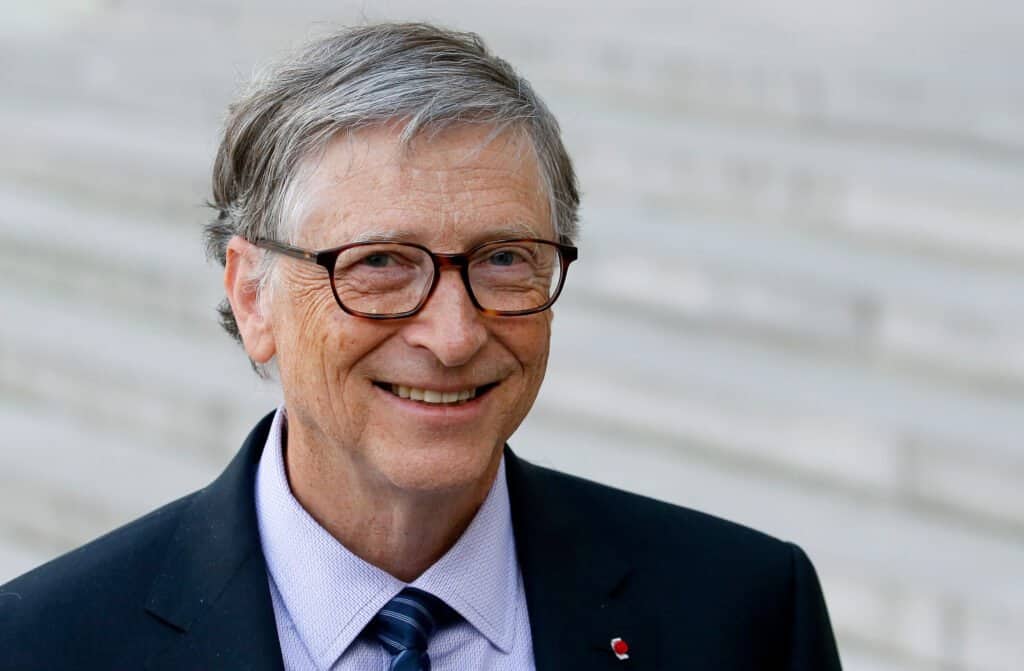As a billionaire, you’d expect philanthropist Bill Gates to eat a lavish diet featuring the likes of golden caviar and 15-year old steak. But in reality, this is not the case.
Bill Gates is not vegan. He was vegetarian for a year during his 20s, but later returned to his carnivorous diet and still cites hamburgers as one of his favorite foods. Despite this, Bill is well-educated on the ethical and sustainability issues surrounding the meat industry and has invested in several vegan businesses.

With veganism on the rise, how is Bill Gates using his fortune to tackle meat consumption rates? Keep reading to find out.
The Future of Meat
From poverty to feminism, Gates is praised in the media for using his wealth to promote the greater good of society. And this reigns true when it comes to veganism.
In a blog post from 2015 titled ‘Should We Eat Meat’, Bill set out the problem with Westernised carnivorous diets.
“Raising animals can take a big toll on the environment. You have to feed the animal far more calories than what you extract when you eat it […] plus clearing forests to make more farmland contributes to climate change, as do the greenhouse gases produced by all those animals”, he explains.
Essentially, Bill believes that we eat too much meat and this is irrevocably killing the planet. He notes that the U.S eats so much pepperoni each year that if all the slices were put side by side they would circle the earth 50 times.
So what’s the solution?
According to Bill, it’s unrealistic to ask everyone to go vegetarian, let alone vegan. Instead, Bill promotes meat reduction.
In the blog post, he says we should “ask the biggest carnivores (Americans and others) to cut back by half as much” or at least “shift towards less intensive meats like chicken”.
Bills focus on richer, western countries acknowledge the fact that without meat, dairy, and eggs, people in poorer countries may not have access to sources of protein.
This highlights an interesting point between meat and money. Bill argues that there is a positive correlation between the amount people earn and their meat intake. In this sense, eating meat is to be considered a luxury.
Beyond Meat
Bill’s outspoken views aren’t the only way he’s helping to promote veganism and remedy meat overconsumption. Back in 2013, Gates invested in California-based, Beyond Meat.
Speaking of the investment Bill said:
“Like most people, I don’t think I can be easily fooled. But that’s just what happened when I was asked to taste a chicken taco and tell whether the meat inside was real or fake […] what I was experiencing was more than a clever meat substitute. It was a taste of the future of food”.
Founded in 2009 by Ethan Brown, Beyond Meat specialize in meat substitutes made from pea protein, rice protein, mung beans, and potato starch.
According to a report by The University of Michigan, the beyond burger requires 90% less greenhouse gas emissions, 46% less energy, and 99% less impact on water scarcity than a quarter pound of American beef.
Since the investment, Beyond Meat has expanded its range beyond chicken substitutes to include beef and pork alternatives. Their infamous Beyond Burger has become an international success, particularly amongst meat-eaters.
Beyond Meat is now sold in over 35,000 stores and restaurants across the globe, including Dunkin’ Donuts, KFC, Subway.
Motif Ingredients
Investing in one vegan business clearly wasn’t enough for Gates, however. In 2019, Bill invested $90 million in Motif Ingredients, a subsidiary of Ginkgo Bioworks.
The company is focused on leveraging biotechnology to create novel solutions for food. More specifically, Motif aims to bioengineer the vitamins and proteins found in milk and meat using yeasts and bacteria in a fermentation process similar to creating beer.
Motif’s CEO Jonathan McIntyre said, “Motif will be key to propelling the next food revolution with affordable, sustainable and accessible ingredients that meet the standards of chefs, food developers, and visionary brands”.